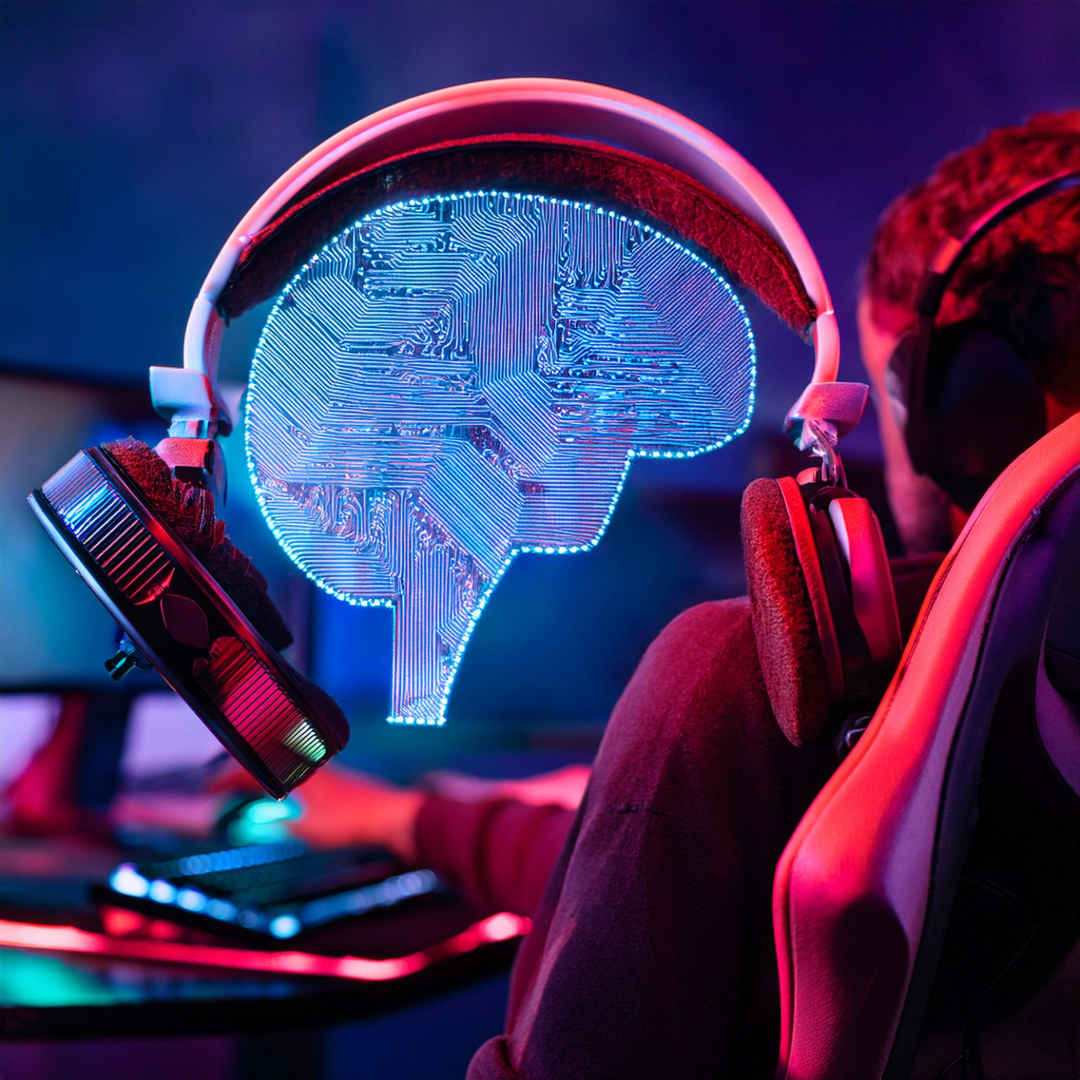The Impact of Artificial Intelligence in Gaming and Streaming: What Does the Future Hold?
Artificial intelligence (AI) is rapidly evolving from a futuristic concept to a tangible reality impacting numerous sectors, with the entertainment industry experiencing a significant transformation. The media and entertainment landscape is increasingly adopting AI technologies to enhance various aspects of content creation, distribution, and consumption. Within this broader context, the gaming industry has historically been at the forefront of technological innovation, readily embracing and even pioneering new technologies, with AI being an integral part of its evolution since the early days of arcade games.
The integration of AI holds immense transformative potential for both the gaming and streaming industries. In gaming, AI is poised to revolutionize everything from the intricate processes of game development to the nuanced experiences of gameplay. Similarly, in the realm of streaming, AI is already playing a crucial role in shaping how users discover, engage with, and enjoy digital content. This guide aims to delve into the multifaceted impact of AI on these two dynamic sectors. It will explore the current applications of AI, offering a snapshot of its present footprint. Furthermore, it will investigate the anticipated future impact of AI, providing insights into the potential evolution of gaming and streaming experiences. The benefits that AI brings to both gamers and streamers will be highlighted, alongside an analysis of the potential challenges and ethical considerations that arise with increasing AI integration. Finally, the guide will showcase examples of innovative AI-powered features and tools currently under development, offering a glimpse into the exciting possibilities that lie ahead.
The early and consistent adoption of AI within the gaming industry suggests an inherent culture of innovation and a proactive approach to integrating cutting-edge technologies. This willingness to experiment and deeply embed AI into various facets of game development and gameplay positions the gaming sector as a potential indicator for AI adoption trends in other industries. The lessons learned and best practices developed in gaming could offer valuable guidance for sectors now beginning to explore the transformative power of AI. Moreover, the increasing prevalence of AI applications across both gaming and streaming platforms signifies a fundamental and enduring shift in how digital entertainment is produced and consumed. This parallel growth in distinct yet interconnected industries points to a broader trend where AI is becoming an indispensable component of the digital entertainment ecosystem, indicating a long-term evolution rather than a temporary surge in adoption.
AI’s Current Footprint in the Gaming Industry
Artificial intelligence is currently deeply embedded in various aspects of the gaming industry, significantly enhancing the player experience through intelligent non-player characters (NPCs) and adaptive gameplay. AI algorithms possess the capability to analyze intricate player behaviors, discern learning patterns, and monitor game speed, ensuring a consistently challenging environment that effectively mitigates monotony. This adaptability creates a more dynamic and engaging experience for players. Furthermore, NPCs are evolving to exhibit more realistic and nuanced behaviors, reacting intelligently to player actions and contributing significantly to the depth and complexity of the game world. Games like The Last of Us showcased sophisticated companion AI for the character Ellie, prioritizing her proximity to the player and providing contextual support, while Alien: Isolation featured an unpredictable and adaptive enemy AI for the Xenomorph, creating a heightened sense of horror. AI’s ability to assess a player’s skill level and even their emotional state allows for the tailoring of the game experience, including dynamic difficulty balancing that adjusts in real-time to match the player’s evolving capabilities.
Procedural content generation, another significant application of AI in gaming, involves the use of algorithms to automatically create game content such as varying difficulty levels, diverse quests, expansive maps, and engaging tasks. This capability not only reduces the time and costs associated with game development but also provides players with virtually endless variations and fresh experiences with each playthrough. Titles like No Man’s Sky and Minecraft serve as compelling examples of the power of AI-driven procedural generation in creating vast and immersive game worlds.
AI also plays a crucial role in intelligent game balancing and testing. It can be employed to ensure fairness and enjoyment in multiplayer games by balancing various elements and parameters. Moreover, AI-powered testing can simulate a multitude of gameplay scenarios, efficiently identifying hidden bugs and optimizing game mechanics at a pace far exceeding that of manual testing. By analyzing extensive player data, AI can also contribute to refining the difficulty balancing of games, ensuring an optimal challenge for a wide range of player skills.
The visual fidelity of modern games is also benefiting from AI integration. AI upscaling techniques are used to transform lower-resolution images into higher-resolution counterparts while maintaining a similar visual appearance. Researchers at NVIDIA have successfully implemented AI-driven upscaling in games such as Cyberpunk 2077 and Control, enabling the delivery of higher-resolution graphics and improved frame rates, enhancing the overall visual experience. Further AI-powered innovations in graphics include real-time ray tracing for more realistic lighting, AI-driven rendering techniques for improved performance, and enhanced character animation and facial expressions for greater realism.
Beyond these key areas, AI is utilized in various other aspects of the gaming industry. Pathfinding and navigation for NPCs are often powered by AI algorithms such as A* and Dijkstra’s algorithm, allowing characters to move intelligently through complex game environments. Data mining on player behavior, facilitated by AI, provides game designers and studios with valuable insights into how players interact with games, which parts they engage with most, and the reasons behind player attrition. This information enables developers to refine gameplay and identify potential monetization opportunities. AI also plays a role in anti-cheat systems by analyzing in-game transactions and player behavior to detect suspicious patterns indicative of cheating. Furthermore, AI can assist in the game design process by analyzing player data and identifying emerging market trends, providing valuable information for future game development. Finally, voice recognition and natural language processing technologies are being integrated to facilitate more natural in-game interactions and to power virtual assistants that can aid players.
The widespread integration of AI across diverse facets of gaming, encompassing NPC behavior, content generation, testing procedures, and graphical enhancements, signifies a comprehensive adoption rather than a collection of isolated applications. This suggests that AI is rapidly becoming a foundational technology underpinning modern game development and the overall player experience, influencing everything from the initial conceptualization to the final interactive encounter. Moreover, AI’s capacity to simultaneously elevate the player experience and optimize crucial development processes underscores its dual value proposition for the gaming industry. It not only leads to the creation of more engaging and personalized games for players but also offers substantial advantages for game developers in terms of enhanced efficiency, reduced costs, and expanded creative horizons. The application of AI in data mining and the analysis of player sentiment further highlights a growing emphasis on understanding and effectively catering to player preferences. This signals a significant shift towards a more data-driven paradigm in game development and marketing strategies, where insights gleaned from AI-powered analysis inform decisions about game updates, the creation of new content, and the implementation of targeted marketing campaigns, ultimately aiming to maximize player satisfaction and retention rates.
AI’s Current Role in the Streaming Industry
In the streaming industry, artificial intelligence is currently playing a pivotal role in enhancing the user experience, primarily through personalized content recommendations. AI algorithms analyze vast amounts of data, including individual viewing habits, content ratings, search queries, and the duration of time spent engaging with specific content, to curate tailored recommendations for each user. Platforms such as Netflix and Amazon Prime Video have developed sophisticated algorithms that effectively suggest content based on the unique preferences of each viewer. This personalization extends beyond simple recommendations, with AI even being used to customize thumbnails and trailers to align with individual user tastes, increasing the likelihood of engagement.
AI is also crucial for content moderation and copyright protection within the streaming ecosystem. AI-driven tools actively work to detect inappropriate or copyrighted material, ensuring that platforms adhere to regulatory standards and community guidelines. During live streaming events, AI can identify potentially problematic elements such as logos, brand names, or other information that could lead to copyright infringement. Furthermore, AI plays a significant role in combating piracy, preventing unauthorized account sharing, and detecting fraudulent activities through the implementation of advanced security analytics.
Improving video quality and streaming efficiency is another key area where AI is making a substantial impact. AI-powered adaptive streaming technology continuously monitors a user’s internet connection and dynamically adjusts the video quality in real-time to prevent buffering and ensure a smooth viewing experience. Additionally, AI-driven encoding techniques can automatically optimize video settings based on the specific type of content being streamed. This process improves compression efficiency, reduces streaming costs for providers, and enhances the overall viewing experience for users. AI also contributes to optimizing content delivery networks (CDNs) by predicting potential traffic congestion and intelligently routing content through less busy servers, minimizing delays and improving loading times for viewers worldwide.
The streaming industry also leverages AI for more effective targeted advertising and content promotion. AI tools, including predictive analytics and consumer behavior analysis, enable streaming services to curate advertisements that are highly relevant to individual users’ viewing preferences. AI-powered behavioral analytics monitor how users interact with advertisements, allowing platforms to continuously refine ad placement and improve overall campaign performance. By analyzing comprehensive audience data, AI can also segment users into specific groups, enabling platforms to identify potential opportunities for cross-selling or upselling related content or services.
Finally, AI is transforming the accessibility of streaming content through automated captioning and transcription services. AI-powered automatic speech recognition (ASR) technology is widely used to generate captions for videos, including live broadcasts, in real-time, making content accessible to a broader audience. AI can also generate accurate transcripts of show tapings and interview recordings, which not only aids in meeting mandatory accessibility compliance but also serves as valuable legal proof of interview statements. Furthermore, AI-powered translation services can translate subtitles and even social media posts, enabling content providers to reach and engage with global audiences more effectively.
The current utilization of AI in streaming primarily centers around improving the end-user experience and optimizing the efficiency of content delivery. This focus suggests a strong commitment within the industry to prioritize viewer satisfaction and engagement through intelligent technological solutions. The significant deployment of AI in content moderation and copyright protection underscores the substantial challenges that streaming platforms face in managing their vast content libraries and adhering to complex legal and regulatory frameworks. AI provides essential tools for automating these critical processes at scale. Moreover, the strategic application of AI in targeted advertising and content promotion reveals an increasing sophistication in the monetization strategies employed by streaming platforms. By leveraging AI to gain a deeper understanding of user preferences and viewing behaviors, these platforms are moving towards more personalized and ultimately more effective approaches to advertising and content marketing.
The Anticipated Future Impact of AI on Gaming Experiences
Looking ahead, the future of AI in gaming promises even more profound and transformative changes, particularly in the realm of non-player characters (NPCs). Future AI advancements will enable NPCs to exhibit genuine emotions and react to player actions with greater nuance and believability. Advanced natural language processing capabilities will facilitate more realistic and engaging conversations between players and NPCs, making in-game interactions feel significantly more natural and immersive. Moreover, NPCs will possess the ability to learn from their interactions with players, dynamically adapting their behavior and responses over time, creating a truly personalized and unpredictable gaming experience.
AI is also poised to revolutionize storytelling within games, leading to the creation of dynamic and personalized narratives. AI-driven storytelling will enable the development of real-time interactive narratives that evolve based on the choices and actions of the player. Games will increasingly feature a “butterfly effect,” where even seemingly minor player decisions can lead to unique and far-reaching consequences, resulting in non-linear storylines that offer high replayability. AI can even generate entirely new interactive narratives based on the history of a player’s previous in-game experiences.
The processes of game design and development are also expected to undergo a significant transformation due to AI. AI-powered game development tools will streamline workflows, making the creation of games faster and more cost-effective. AI-driven procedural content generation will become even more sophisticated, allowing developers to efficiently build vast and varied game worlds with unprecedented detail and complexity. Furthermore, AI will assist in various artistic aspects of game development, including character design, the creation of intricate environment textures, and the generation of realistic animations, freeing up human artists to focus on more creative and strategic endeavors. AI will also play a role in optimizing in-game economies, analyzing player data to predict demand and adjust virtual goods and services accordingly.
The integration of AI with virtual reality (VR) and augmented reality (AR) technologies holds immense potential for creating entirely new and immersive gaming experiences. AI algorithms can enhance the adaptability, overall immersion, and the quality of interactions within AR, VR, and mixed reality environments. AI-powered environments will contribute to making VR experiences feel significantly more realistic and engaging for players. Moreover, AI will enhance crucial aspects of VR and AR gaming such as motion tracking, the accurate recognition of virtual and real-world objects, and the enabling of more natural and intuitive real-time interactions.
The trajectory of AI in gaming clearly points towards the development of highly personalized and adaptive experiences, where the game world and its narrative framework will dynamically respond to the unique actions and evolving preferences of each individual player. This emphasis on creating smarter NPCs, implementing dynamic storytelling techniques, and offering adaptive difficulty levels signifies a fundamental shift away from static, one-size-fits-all game experiences towards more fluid and deeply engaging interactions that are specifically tailored to the individual. Furthermore, AI is projected to exert a substantial influence on the entire game development pipeline, potentially democratizing the process of game creation by making it more efficient, less expensive, and therefore more accessible to independent developers and smaller studios. The capacity of AI to automate various tasks such as content generation, rigorous testing, and other traditionally time-intensive development processes could significantly lower the barriers to entry, fostering a greater degree of innovation and diversity within the gaming landscape. The synergistic integration of AI with immersive technologies like VR and AR has the potential to unlock truly groundbreaking gaming experiences that will blur the established boundaries between the virtual and the physical realms. By enhancing the level of realism, the quality of interactivity, and the degree of adaptability within these environments, AI can facilitate new levels of immersion and engagement that could fundamentally transform how we play and experience video games.
The Anticipated Future Role of AI in Transforming Streaming Technologies and Content Delivery
The future of streaming is expected to be characterized by hyper-personalization, with artificial intelligence empowering platforms to understand and cater to the nuanced preferences of individual viewers at an unprecedented level. AI will enable even more granular analysis of user preferences, leading to highly tailored content recommendations and viewing experiences that are uniquely aligned with individual tastes. Platforms will leverage AI to dynamically curate content and instantly adjust recommendations based on real-time user interactions as well as external factors such as trending topics and current events. Personalized video playback will become the norm, with AI intelligently adjusting video quality, the sequence of content presented, and even the language options based on the specific preferences of each user.
AI is also poised to significantly transform the process of content creation within the streaming industry, offering a suite of intelligent tools that assist with various stages of production. AI can aid in generating innovative script ideas, drafting compelling dialogue, and even predicting the potential success of a show based on various factors. AI-driven video editing software will automate traditionally time-consuming tasks such as color correction, audio leveling, and scene transitions, allowing human editors to focus on more creative aspects of their work. Furthermore, AI will enhance the creation of visual effects and computer-generated imagery (CGI), automating complex technical tasks and enabling the generation of hyper-realistic virtual environments. The rise of generative AI will lead to more efficient content creation workflows, facilitate rapid experimentation with different creative approaches, and provide content creators with a deeper understanding of viewer behaviors and expectations.
The efficiency and reliability of content delivery networks (CDNs) will be further optimized through the application of AI and machine learning. These technologies will be crucial for predicting network traffic patterns and intelligently rerouting content through less congested servers, ensuring seamless streaming experiences for users around the globe. AI will also play a vital role in accurately predicting CPU loads and the necessary cloud capacity requirements for streaming platforms, enabling more efficient allocation of resources and minimizing unnecessary expenditures. By analyzing historical data and real-time trends, AI can anticipate both routine usage patterns and unexpected surges in viewing demand, such as during major live events or the premiere of highly anticipated content.
Predictive analytics, powered by AI, will become an increasingly important tool for shaping content strategy and acquisition decisions within the streaming industry. AI will help platforms identify emerging trends and accurately predict the types of content that are most likely to resonate with target audiences, thereby guiding both the creation of original content and the acquisition of existing programming. This capability will enable streaming companies to tailor their content offerings to audience preferences with greater precision and immediacy. AI will analyze vast amounts of data from various sources, including social media activity, user reviews, and viewing statistics, to provide valuable insights that inform strategic content decisions.
The future of streaming will be fundamentally shaped by hyper-personalization, with AI acting as the engine that enables platforms to understand and cater to the individual preferences of each viewer on an unprecedented scale. The convergence of AI in content recommendations, personalized playback settings, and sophisticated predictive analytics suggests a future where streaming experiences are highly individualized and precisely aligned with the unique tastes of every user. Moreover, AI is set to revolutionize the content creation process within the streaming industry by providing powerful tools that assist with various stages of production, from the initial conceptualization of scripts to the final rendering of visual effects. This will potentially lead to more efficient and innovative content production workflows. By automating tedious and repetitive tasks and offering intelligent creative assistance, AI can empower human content creators to focus on higher-level storytelling and artistic vision, potentially resulting in a greater volume and diversity of available content. The strategic application of AI in optimizing content delivery and accurately predicting viewer demand indicates a strong industry focus on ensuring a consistently seamless and cost-effective streaming experience, which is crucial for maintaining high levels of user satisfaction and overall platform profitability. By intelligently managing network resources and proactively anticipating viewing patterns, streaming platforms can significantly improve video quality, minimize buffering issues, and optimize their underlying infrastructure costs, ultimately benefiting both the service providers and the end-users.
Potential Benefits of AI for Gamers
Artificial intelligence offers a multitude of potential benefits for gamers, primarily centered around creating more immersive and engaging gameplay experiences. Realistic non-player characters (NPCs) that react intelligently and believably to player actions contribute significantly to a more immersive and believable game world. Dynamic and adaptive game environments, powered by AI, can offer personalized challenges and experiences that evolve based on player interactions and preferences. AI’s ability to create life-like situational developments and introduce increasing levels of complexity ensures that gamers remain engaged and invested in the gameplay.
Gamers can also benefit from personalized challenges and adaptive difficulty levels made possible by AI. AI algorithms can continuously analyze a player’s performance and dynamically adjust the game’s difficulty in real-time, ensuring a balanced and engaging challenge that caters to a wide range of skill levels. This adaptability allows games to tailor themselves to individual player capabilities, providing a more customized and ultimately more enjoyable experience.
Furthermore, AI opens the door to new and innovative gaming experiences. Procedural content generation, driven by AI, can offer virtually endless variations in gameplay and unique adventures with each session. AI also unlocks possibilities for future innovations in gaming, such as enhanced adaptability and immersion within augmented reality (AR), virtual reality (VR), and mixed reality environments. AI-driven storytelling has the potential to create unique, unpredictable, and highly personalized narrative experiences that respond directly to player choices and actions.
The primary advantage that AI brings to gamers is its capacity to craft more personalized and deeply engaging experiences that are specifically tailored to individual playstyles and preferences. The emphasis on adaptive gameplay, dynamically adjusted difficulty, and personalized content suggests that AI aims to make games more enjoyable and rewarding for a broader spectrum of players, regardless of their skill level or preferred playstyle. Moreover, AI-driven procedural content generation promises to significantly enhance the replayability and the sense of discovery within games by generating vast and unique virtual worlds that players can explore and interact with. The ability of AI to algorithmically generate diverse game content can lead to games with virtually limitless possibilities, effectively keeping players engaged for much longer periods. The integration of AI with emerging technologies such as AR and VR has the potential to unlock entirely new and unprecedented forms of interactive entertainment, pushing the established boundaries of what gaming can be and offering experiences that blur the lines between the virtual and the real world.
Potential Benefits of AI for Streamers
Artificial intelligence offers numerous potential benefits for streamers, significantly enhancing their ability to engage with their audience and streamline their content creation workflows. AI can analyze audience emotions and preferences in real-time, providing streamers with valuable insights into what resonates with their viewers and enabling them to tailor their content accordingly. AI algorithms can also accurately target potential viewers by promoting live broadcasts to users based on data processing and preference analysis, thereby improving the effectiveness of marketing efforts and audience growth. Furthermore, AI-powered chatbots can be integrated into live streams to engage viewers with interactive features such as live polls and gamification elements, enriching the overall customer experience and fostering stronger community connections.
AI can also significantly improve the efficiency of content creation workflows for streamers by automating various repetitive and time-consuming tasks. This includes tasks such as data entry, the generation of reports, and the tagging of metadata, freeing up streamers to dedicate more time and energy to the core activity of creating engaging content. AI can also assist with post-production processes such as video editing, proofreading written content, and even generating effective ad copy for promotions. For virtual streamers, AI can even aid in the design and continuous improvement of their virtual image and the overall aesthetic of their live streaming environment.
Streamers can also leverage AI to unlock better monetization opportunities. By analyzing viewer data, AI can segment audiences into specific groups, allowing streamers to identify potential opportunities for cross-promotion of related content or upselling premium features and services. AI can also help streamers curate more targeted advertisements that align with the specific preferences of their viewers, leading to increased viewer engagement with the ads and ultimately higher conversion rates. Moreover, AI can optimize ad strategies by continuously monitoring how viewers interact with advertisements and ensuring that ads are strategically placed and served at the most effective times to maximize performance.
AI also offers tools to streamline various aspects of platform management for streamers. This includes automating the processes of onboarding new viewers and verifying user accounts. AI-powered virtual assistants can provide 24/7 support by answering common audience queries and providing basic information, reducing the workload on the streamer. AI can also monitor a streamer’s content portfolio to ensure compliance with platform rules and predefined policies. Additionally, AI can automate the analysis of regulatory documents, helping streamers stay compliant with ever-evolving legal requirements. AI can also assist with content tagging, which improves the user experience for viewers by making content more easily discoverable. For live streamers, AI can even identify and automatically blur brand images or copyrighted material in real-time during a broadcast, helping to prevent unintentional copyright infringement.
AI provides streamers with powerful tools to gain a deeper understanding of their audience and enhance engagement, ultimately leading to increased viewership and the development of stronger community bonds. By analyzing audience data and providing interactive features, AI empowers streamers to create content that resonates more effectively with their viewers, fostering greater loyalty and facilitating channel growth. Furthermore, AI can automate many of the routine operational and administrative tasks associated with streaming, allowing creators to allocate more of their valuable time and energy to producing high-quality and engaging content. The automation of tasks such as content moderation, metadata tagging, and copyright management can significantly reduce the workload for streamers, leading to improved efficiency and overall productivity. AI also offers valuable tools for streamers to optimize their monetization strategies by enabling more precise targeting of advertisements and identifying new avenues for generating revenue from their content. By leveraging AI to better understand viewer behavior and preferences, streamers can deliver more relevant advertisements and explore innovative ways to monetize their creative work.
Potential Challenges and Ethical Considerations Associated with AI in Gaming and Streaming
The increasing integration of artificial intelligence in gaming and streaming brings forth several potential challenges and significant ethical considerations that warrant careful examination. One primary concern revolves around the potential for bias and lack of fairness in AI algorithms. AI algorithms are trained on vast datasets, and if these datasets contain inherent biases, the algorithms can inadvertently perpetuate and even amplify these biases, leading to discriminatory outcomes. In gaming, this could manifest as biased behavior in non-player characters (NPCs), unfair matchmaking systems that favor certain players, or the unintentional perpetuation of harmful stereotypes within game content. It is therefore crucial to ensure that AI algorithms used in both gaming and streaming do not discriminate against individuals based on protected characteristics such as race, gender, or religion. Developers and platform providers must implement robust measures to identify and address potential biases in AI decision-making processes, particularly in multiplayer games where fairness and equality are paramount. This necessitates a careful and ongoing process of checking and refining AI systems to mitigate the risk of bias.
Data privacy and security represent another significant area of concern. AI-powered systems often require access to and analysis of large quantities of personal data to function effectively, raising important questions about the collection, storage, and usage of this information. In gaming, the collection and use of player data to facilitate personalized experiences can lead to legitimate privacy concerns. Similarly, streaming platforms gather sensitive information about users’ viewing preferences, behaviors, and demographics, making it imperative to implement robust data protection measures and adhere to stringent regulations such as the General Data Protection Regulation (GDPR) to safeguard user data. Transparency regarding data collection and usage practices, along with providing users with options to control their data, are essential for building trust and ensuring ethical data handling.
The increasing capabilities of AI also raise questions about its potential impact on human creativity and employment within the entertainment industries. Concerns exist that AI could potentially devalue human artistry and undermine job security, particularly in traditionally creative fields such as game design, writing, and visual arts. While AI can undoubtedly automate many repetitive and time-consuming tasks, the unique human intuition, emotional depth, and artistic flair that are often integral to creating truly compelling and innovative content may be difficult, if not impossible, for AI to fully replicate. Therefore, striking a careful balance between leveraging the efficiency and capabilities of AI and preserving the essential role of human creativity in both gaming and streaming is a critical consideration.
Finally, the ethical implications of AI-driven personalization and the potential for manipulation are significant concerns. AI can be used to subtly influence player behavior in games, potentially encouraging excessive spending on microtransactions or promoting longer-than-necessary playtime. In streaming, the use of AI in targeted advertising and content curation raises ethical questions about the potential for manipulating user preferences and behaviors. Maintaining transparency and ensuring a sense of balance are crucial aspects of ethical game design to prevent players from feeling pressured or misled by AI-driven systems. Concerns also exist regarding the inherent potential for bias within AI algorithms and the critical need for greater transparency in how these algorithms function and make decisions. The lack of transparency in AI algorithms can also lead to legal concerns related to consumer rights, data privacy, and overall accountability.
The ethical challenges posed by AI in gaming and streaming are complex and multifaceted, encompassing critical issues such as algorithmic bias, the protection of user data privacy, the fundamental value of human creativity, and the potential for subtle manipulation of user behavior. The diverse range of these ethical concerns underscores the profound and far-reaching impact that AI is having on these industries and highlights the urgent need for careful consideration of the broader societal implications. Finding a responsible balance between the significant benefits of AI-driven personalization and the inherent risks associated with data privacy violations and potentially manipulative practices represents a critical challenge for both gaming and streaming platforms as they continue to integrate AI into their core operations. Furthermore, the increasing integration of AI into traditionally creative fields raises fundamental questions about the very definition of art, the evolving role of human artists and creators, and the potential for AI to displace human workers within the creative economy. As AI becomes increasingly capable of generating creative content, it is essential to thoughtfully consider its long-term impact on the creative landscape and the value that society places on human ingenuity and artistic expression.
Innovative AI-Powered Features and Tools Currently Being Developed
The landscape of gaming and streaming is rapidly evolving with the development of numerous innovative AI-powered features and tools. In the gaming sector, several exciting advancements are underway. AI-driven asset generation tools, such as Sloyd and Tripo, are enabling developers to rapidly create 3D models and entire game environments from simple user inputs, including even uploading images for instant 3D model generation. Inworld is specializing in creating AI-driven NPC behavior, allowing for dynamic and highly realistic interactions with unique character personalities and emotional responses. Cascadeur is enhancing the animation process by using AI to predict and refine character poses, as well as adding realistic physical behaviors to animations, significantly streamlining the animation workflow. ElevenLabs is providing a cutting-edge AI voice synthesizer that offers realistic voice acting in multiple languages, proving particularly useful for indie game projects. Versatile tools like ChatGPT are also finding applications in game development, assisting with learning new concepts, generating structured documentation, and providing a solid foundation for coding projects. Furthermore, AI-powered tools are being actively developed to streamline overall game development workflows, shorten production timelines, and facilitate the creation of dynamic and highly engaging in-game experiences. The integration of AI into cloud gaming platforms is even allowing players to upload photos of characters, objects, or landscapes and instantly generate high-fidelity 3D models that can be integrated directly into the game. Remarkably, AI is now being used to build entire games, such as flight simulators, in incredibly short timeframes, demonstrating its growing power and efficiency in game creation. NVIDIA is also offering a comprehensive suite of AI development tools and platforms specifically designed for the gaming industry, empowering developers with the latest AI capabilities. AI-powered game design tools like Ludo.AI and Rosebud are designed to accelerate the early phases of game development, assisting with ideation, prototyping, character creation, and animation through the power of artificial intelligence. Major game engines like Unity and Unreal Engine have integrated their own AI toolkits, enabling developers to create more intelligent agents, sophisticated non-player characters, and dynamically adaptive game environments. Finally, computer vision and facial recognition technologies are being increasingly utilized for various purposes within gaming, including creating more realistic facial animations, allowing for the creation of personalized player avatars, enabling emotion detection for adaptive gameplay, and facilitating advanced motion and performance capture.
In the streaming industry, a range of innovative AI-powered features and tools are also under development. AI-powered Video Content Management Systems (VCMS) are automating numerous time-consuming tasks, such as automatic transcription and subtitling of video content, as well as the generation of detailed metadata. AI is significantly enhancing video search and discoverability by intelligently analyzing objects, spoken words, and on-screen text within video content, making it easier for users to find what they are looking for. AI is also providing powerful predictive analytics capabilities, enabling streaming platforms to better understand audience engagement patterns and make more informed decisions regarding content strategy. Personalized viewer experiences are being further refined through AI-powered behavioral analysis and adaptive content delivery mechanisms that tailor the viewing experience to individual user preferences. AI is also facilitating real-time generation and translation of subtitles, making content more accessible to a global audience. Sophisticated AI-powered analytics tools are tracking viewer behavior in real-time, providing valuable insights into content popularity, audience demographics, viewing trends, and overall engagement metrics. To ensure a smooth viewing experience across various internet conditions, AI algorithms are dynamically adjusting video streaming quality based on individual user network capabilities and bandwidth availability. AI is also playing a crucial role in protecting copyrighted content by continuously monitoring and detecting unauthorized distribution or use of content on streaming platforms. To keep users informed and engaged, AI systems are being developed to deliver personalized notifications and alerts about new content releases and relevant platform updates. Moreover, AI is enabling the integration of interactive features within streaming platforms, such as live polls, quizzes, and interactive storytelling elements, fostering greater audience participation. Platforms like BytePlus Live are offering comprehensive AI-powered solutions that include advanced video quality optimization, real-time stream performance analytics, and intelligent tools for enhancing audience engagement. AI is also being integrated into search functionalities to better understand natural language queries and enhance overall user interaction with streaming platforms. Finally, AI can analyze and extract text directly from video frames, significantly improving content accessibility and making it easier to search and index video content.
The current wave of development in AI-powered tools for both gaming and streaming indicates a strong industry-wide conviction in the transformative potential of artificial intelligence. The sheer volume and diverse range of these innovative tools being created suggest a substantial investment and focused effort towards leveraging AI to address existing challenges and unlock entirely new possibilities within these dynamic entertainment sectors. A significant number of these emerging AI tools are specifically designed to automate tasks that have traditionally been time-consuming and labor-intensive, pointing towards a clear drive for increased efficiency and overall productivity in both content creation and delivery processes. By automating tasks such as generating game assets, creating animations, editing video content, and managing metadata, AI can free up human creators to concentrate on the more strategic and creative aspects of their work, potentially leading to higher quality and more innovative outcomes. Furthermore, the development of AI-powered interactive features for streaming platforms suggests a future where content consumption evolves into a more engaging and participatory experience for viewers. The integration of features like live polls, interactive quizzes, and dynamic storytelling indicates a shift away from passive viewing towards more immersive and interactive forms of digital entertainment.
Expert Opinions and Industry Forecasts on the Long-Term Influence of AI
Industry experts and analysts predict a significant and sustained growth trajectory for the integration of artificial intelligence in both the gaming and streaming markets. The AI in video games market is projected to reach a substantial $11.4 billion by the year 2032, demonstrating a robust compound annual growth rate (CAGR) of 26.8% from 2023 to 2032. Another report estimates the global AI in games market will grow from $2.44 billion in 2024 to $5.75 billion by 2029, with a CAGR of 18.7%. Bloomberg Intelligence forecasts that the niche of AI-integrated blockchain gaming alone will become a $50 billion industry by 2030. The broader global gaming industry is expected to surpass $200 billion in revenue by 2025, with AI playing an increasingly vital role in driving this growth. In the streaming sector, the generative AI market, which has significant implications for video content management, is projected to reach a staggering $1.3 trillion by 2032, growing at an impressive CAGR of 42%. The overall market for AI surpassed $184 billion in 2024 and is projected to reach $826.7 billion by 2030, exhibiting an annual growth rate of 28.46%. Within this larger AI market, generative AI specifically reached $36.06 billion in 2024 and is expected to surge to $356.10 billion by 2030, with an exceptional CAGR of 46.47%.
Insights from industry leaders and analysts further illuminate the anticipated future trends. Experts predict that AI will be capable of handling more than half of all game development tasks within the next 5 to 10 years, particularly in areas such as content planning and the automation of routine processes. AI is expected to influence every stage of game development, extending far beyond its traditional applications in NPC behavior and difficulty settings. Generative AI technology is projected to account for as much as 50% of all asset development in games, leading to a significant increase in productivity of up to 40%. AI-powered personalization is also anticipated to play a crucial role in enhancing player engagement and driving monetization within the gaming industry. In the streaming domain, AI is emerging as a key driving force behind enhanced viewer experiences. It is expected to become increasingly sophisticated in its ability to understand context, leading to more nuanced and effective content moderation. Predictive analytics, powered by AI, will likely result in the creation of more original, engaging, and innovative video content. Furthermore, AI-enhanced search functionalities will improve content discoverability and lead to higher levels of user engagement with streaming platforms. AI is also predicted to help media companies more accurately forecast their cloud capacity requirements, enabling them to optimize resource allocation and reduce operational costs.
The long-term influence of AI is expected to fundamentally reshape the future of entertainment. AI is already making games more personalized and exciting for players. It is revolutionizing content creation, personalization strategies, and overall audience engagement across the broader entertainment industry. AI fosters greater engagement by enabling highly personalized user experiences in both the gaming and sports sectors. It is also unlocking new levels of creativity in game design by empowering developers to create complex and imaginative worlds with greater ease and efficiency. The gaming industry’s ongoing journey with AI serves as a valuable example for other industries looking to leverage this technology to enhance human capabilities and experiences. For game developers, AI is streamlining the game design process, automating tedious tasks, and enhancing the quality of player interactions. In the realm of esports, AI is enhancing the competitive landscape by analyzing player performance, predicting match outcomes, and optimizing strategic gameplay. AI is also playing a pivotal role in advancing the immersive experiences offered by VR and AR gaming technologies. Furthermore, AI is revolutionizing the game testing process by automating the detection of bugs and ensuring higher levels of quality assurance.
Key Market Forecast Table:
| Sector | Year | Market Size (USD Billion) | CAGR (%) | Source |
|---|---|---|---|---|
| AI in Video Games | 2022 | 1.1 | – | Allied Market Research |
| AI in Video Games | 2023 | – | 26.8 (23-32) | Allied Market Research |
| AI in Video Games | 2024 | 2.44 | – | TBRC |
| AI in Video Games | 2025 | 2.89 | 18.8 (24-25) | TBRC |
| AI in Video Games | 2029 | 5.75 | 18.7 (25-29) | TBRC |
| AI in Video Games | 2030 | 50 | – | Bloomberg Intelligence (Blockchain Gaming) |
| AI in Video Games | 2032 | 11.4 | – | Allied Market Research |
| Global Gaming | 2025 | 200+ | – | OyeLabs |
| Generative AI | 2024 | 36.06 | – | Vention Teams |
| Generative AI | 2030 | 356.10 | 46.47 (24-30) | Vention Teams |
| Overall AI Market | 2024 | 184+ | – | Vention Teams |
| Overall AI Market | 2030 | 826.7 | 28.46 (24-30) | Vention Teams |
The consistently high compound annual growth rate projections for AI within the gaming sector, as reported by multiple independent sources, indicate a strong consensus among industry analysts regarding the significant future expansion of this market. These double-digit growth rates suggest that AI is not merely a peripheral application within gaming but rather a fundamental driving force that is poised to substantially increase the market’s overall value in the coming years. Furthermore, the massive projected growth of both the overall AI market and the specific generative AI market underscores the broader technological context in which the integration of AI in gaming and streaming is currently taking place. This suggests that ongoing advancements in these wider fields of AI technology will likely serve as a powerful catalyst for further innovation and development within the entertainment industries. Expert opinions from across the sector consistently point towards a future where AI becomes deeply and intricately integrated into both the creative and the operational aspects of gaming and streaming. This suggests a fundamental transformation of these industries, where AI is no longer viewed as simply an add-on feature but as a core component that underpins how entertainment content is created, delivered to audiences, and ultimately experienced by users.
Conclusion: Embracing the AI-Powered Future of Entertainment
In conclusion, artificial intelligence is undeniably revolutionizing both the gaming and streaming industries, leaving an indelible mark on everything from the initial stages of content creation to the final user experience. Current applications of AI are already enhancing the quality and engagement of gameplay, providing personalized content recommendations, and significantly streamlining various operational processes. The future landscape promises even more immersive, highly personalized, and remarkably efficient entertainment experiences, all powered by the ever-evolving capabilities of AI.
AI presents numerous compelling benefits for both gamers and streamers, including the potential for significantly enhanced engagement, more efficient content creation workflows, and the emergence of entirely new creative possibilities. However, it is crucial to acknowledge and proactively address the significant challenges and ethical considerations that arise with the increasing integration of AI. Issues such as algorithmic bias, the imperative need for robust data privacy and security measures, and the potential impact of AI on human creativity must be carefully navigated with a strong sense of responsibility.
Special Offer: At daryo89.pro, we recognize the critical importance of achieving a seamless and high-quality streaming experience. If you require expert assistance in optimizing your streaming software to ensure peak performance and viewer satisfaction, our dedicated team offers comprehensive remote support services at a highly competitive price point. Contact us today to explore how we can help you elevate your streaming capabilities!
The transformative nature of AI in entertainment signifies a fundamental shift in how content is created and consumed, moving beyond incremental technological improvements to a more profound redefinition of the entertainment landscape. While the immense potential of AI is undeniable, it is equally important to maintain a balanced perspective by proactively addressing the associated challenges and ethical considerations. This thoughtful and responsible approach will be essential to harnessing the full power of AI while mitigating potential risks. The strategic inclusion of the special offer for streaming software optimization services at the end of this guide provides a direct and relevant call to action for the target audience, aligning with the user’s initial request to promote their expertise in this area. By positioning this offer within the context of a comprehensive overview of AI’s impact on streaming, it is more likely to resonate with readers who are now better informed about the complexities and potential optimization needs within the evolving streaming ecosystem.












Add comment